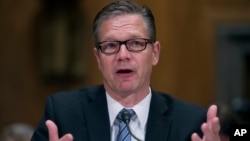The top inspector for the agency that protects America’s flying public said he is “deeply concerned about its ability to execute its important mission.”
Homeland Security Inspector General John Roth said Tuesday his team has uncovered “significant vulnerabilities” in the Transportation Security Administration’s conduct of airport screenings, among other shortcomings.
Roth’s testimony before the Senate Homeland Security Committee followed IG reports that the TSA failed to identify 73 workers with links to terrorism, and failed to detect simulated weapons and other dangerous items in 96 percent of tests conducted at airport screening checkpoints.
“We have deep concerns about the manner in which TSA manages this risk,” Roth said.
Established after 9/11
TSA was established after the terrorist attacks of September 11, 2001, in which hijackers slammed jetliners into New York’s World Trade Center as well as the Pentagon.
Revelations that aviation vulnerabilities remain have alarmed the public and U.S. lawmakers.
“TSA screens nearly 2 million passengers each day, nearly 660 million every year,” Homeland Security Committee Chairman Ron Johnson said. “That is an enormous task.”
Whistle-blowers within TSA and other related agencies also testified before the committee, and pinpointed problems they have witnessed, including inattention to a large list of passengers approved for rapid TSA screening at U.S. airports.
“TSA is handing out pre-checked status like Halloween candy in an effort to expedite passengers as quickly as possible despite self-admitted security gaps that are being created by the process,” said Rebecca Roering, a TSA supervisor at Minneapolis-St. Paul International Airport.
Vulnerabilities
Airplanes are also vulnerable to easily concealed explosive devices in luggage or meals and supplies delivered on board, said Robert McLean, a federal air marshal.
“If a terrorist group puts thought into it, it is relatively easy to sneak small bombs into jets in order to blow up at high altitude,” McLean said.
Aside from the sheer volume of air traffic, the inspector general noted that TSA agents suffer from the boredom of a screening task performed over and over again, day after day.
“TSA cannot afford to miss a single genuine threat without potentially catastrophic consequences,” Roth said. “A terrorist only needs to get it right once.”
Since 9/11, terrorists have attempted attacks in the skies by placing explosives in passengers’ shoes and underwear. Although those plots were foiled, lawmakers worry it is only a matter of time before one succeeds.
“We should be focused on perfection,” said Senator Tom Carper, the committee’s top Democrat. “We will never get there, but that should be our goal.”
Those testifying suggested multiple improvements to the system, from better training of TSA agents to boosting the agency’s ability to weed out employees with suspected links to terrorism.




